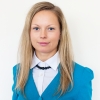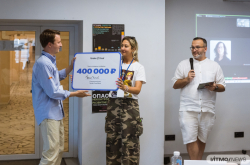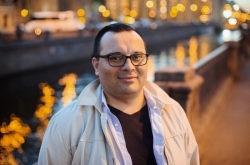The SumIT brand came about in 2012. In the very beginning it represented a comprehensive acceleration program for Russian IT projects. In 2015 it was succeeded by the Future Technologies accelerator program; over the course of five to six months, the mostly St.Petersburg-based participants were mentored by leading experts who helped them develop their skills. Then the SumIT name was used to depict an international summer school which was an umbrella of startup acceleration courses developed in collaboration with the University of California, Los Angeles. Last year, ITMO’s Business Incubator resumed this program together with colleagues from South Korea.
“Our SumIT co-hosting partner choice isn’t limited by one specific country. Last year we expanded our partnership network by establishing contacts with colleagues from South Korea and decided to develop a program focusing on innovative projects that emerge on the South Korean market. This year we held an open call for participants. The final program composition turned out to be very diverse: nineteen of our participants hail from all over Russia, two participants are Croatian, and one came from as far as Cameroon. Our main selection criteria for the 2018 summer school participants was their motivation. That’s why we asked the summer school applicants to write a small motivation letter. We then looked at how useful and relevant their projects were, which is very important for us as the program is mainly practice-oriented. But we also pay special attention to teamwork,” says the head of ITMO’s Entrepreneurship Center Elena Gavrilova.
The summer school participants have a busy but exciting two weeks ahead: they will attend numerous workshops on the fundamentals of PR, communications in marketing, emotional intelligence, financial planning, target audiences analysis, and other subjects vital for success in the business world. All throughout the acceleration program, participants will be mentored by ITMO University’s Entrepreneurship Center expert staff Elena Gavrilova, Alexander Alkhov, Alexey Solomatin, Alexander Ostroukhov, and Maxim Ivanov.
“Our teaching approach is based on tried-and-tested study formats honed over the course of previous acceleration programs. For the most part, the summer school consists of practice-oriented workshops. We begin by giving participants the bare theoretical minimum needed for solving practical cases, show them various document templates and explain how to complete them, and then starts the core practical group work. We do our best to include in the program different industry-specific events. At the moment we’re working with the Internet Initiative Development Fund (IIDF) to invite a leading American guest speaker. The ideal program for us would be one including international projects which have already accomplished something on their home markets, whether that will be introducing a ready product or creating a prototype and making their first sale. The project authors usually come to Russia aiming to test the Russian market. Last year’s experience made us realize that despite all the market successes and contest wins, project teams often don’t have a clue about basic business concepts such as how to identify a product’s target audience and analyze the market. We adapted the program accordingly and now focus on creating a solid theoretical base and explaining the market’s regional features,” shares Elena Gavrilova.

Boris Mouako Djeumako, Cameroon
I am participating with an ecology-oriented project called AfroGreenTech. Ecology is a topic very close to my heart as I come from a family of farmers and as a child I often worked with my grandfather in the fields. But nowadays farmers are confronted with a serious challenge in the face of climate change. The dry season is getting longer and fields are often destroyed by floods, which has a huge negative impact on people from my community. Luckily, we have access to the latest technological developments and can use them to change our world for the better. That inspired me to work on technologies which will help farmers prosper in these uneasy times.
Bearing in mind that we have to come up with a technology that is accessible to farmers, we analyzed the farming businesses needs and costs and established that their financial losses are mainly caused by the lack of formalization and insufficient business accounting data. These factors lead to farmers’ failure to manage investment risks and complicate their interactions with fiscal institutions. That’s why we plan to create the first African digital platform that will help farmers get the much-needed finance support and draw up a bespoke strategic development plan, at the same time providing them with cutting-edge farming technologies that will spur their business growth.

We will launch our platform in connection with an online ambassador program which will focus on training young people who will then go on to work with farmers. Their task will be to gather reliable data that will help us make the right decisions when offering and managing credits. Subscription fees and credit interests will be our primary sources of revenue. After creating a solid farming community, we plan on expanding our platform to other agricultural businesses such as seeds, fertilizers, and equipment vendors, as well as produce resellers, food companies, and hotels, all of whom are interested in collaborating with trustworthy supply networks.
This will give us an opportunity to perfect the technologies and services we offer, as well as set approachable purchase rates for our products. By introducing an innovative credit and insurance model based on detailed data analysis, our platform will give struggling farmers access to stable financial support.
I want to use my time at the SumIT program to establish useful connections and gain new skills which will help me make my platform the best it could be: effective, safe, reliable, and easy to navigate. I would also like to work on my fundraising skills to make my startup more commercially viable.

Elena Dymova, Syktyvkar, Russia
I am an English teacher and founder of a Busy Lizzie the Bee English learning school for children. I enrolled to SumIT together with Alexander Nekrasov, who heads the Pitirim Sorokin Syktyvkar State University laboratory.
We wanted to present a social media data analysis project but then decided to drop that concept as we realized that it was much more complex, labor-intensive, and technically nuanced than we initially thought. One day we were talking with other participants and mentors and the subject of food came up: we were all marveling at how much of it we buy and then throw away because it’s not humanly possible to eat it all.
I thought of my mother-in-law who lives in the countryside and grows so much fruit and vegetables that both her and my family just can’t go through it all, so a huge part of her harvest goes to waste. I realized how great it would be if she’d had an opportunity to sell some of her home-grown produce before it gets bad. I also often come across similar social media posts of people wanting to sell some of their crops. So we came up with an idea of an app aimed at city dwellers who don’t have a dacha but still want to buy locally-grown fruit and veg for them and their kids. All they’ll need to do is to go on the app and post an order indicating what they want to buy and when and how it should be delivered. A farmer then gets an order notification. If they accept it, the order changes its status and both farmer and client are redirected to a chat window to talk details.

Tin Ceraj, University of Zagreb, Croatia
I came here with a project in melanoma detection technologies, but had to change it due to time constraints and some team members’ decision to withdraw. So I came up with an idea of a service that will help connect promising students in search of jobs or internships with companies ready to provide them.
My team partner and I decided to explore this area because we understood that companies have a hard time searching for students that are available for full-time or part-time jobs and internships. Vice versa, it’s not easy for students to find companies they could work in. We think that this situation persists as there’s no platform enabling students to see what each company offers, compare it with other companies, and apply for a job.
We plan on filling this gap by creating a database of student-friendly companies. Students will have free access to this service giving them access to lots of employment options.
We hope that the SumIT program will provide us with valuable management, business, and marketing skills necessary for launching a successful startup.
The summer school will conclude with a Demo Day on August 31. The event gives the teams the chance to pitch their projects to leading experts and investors.






